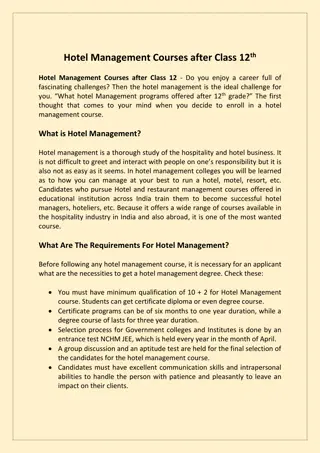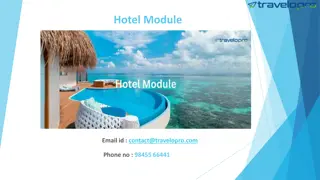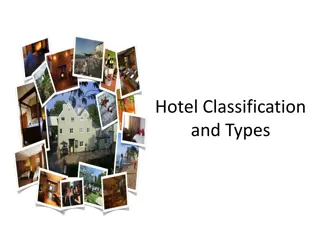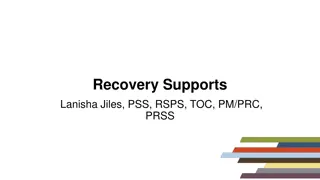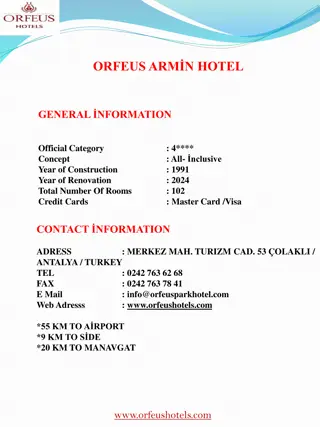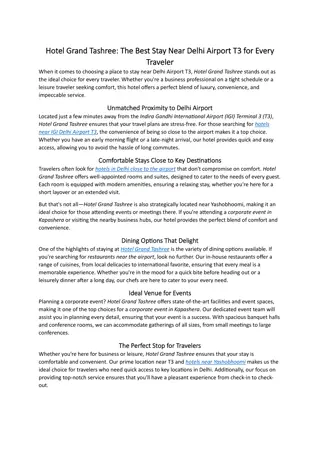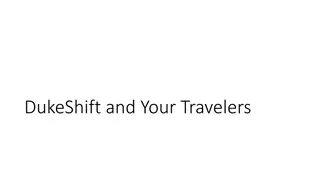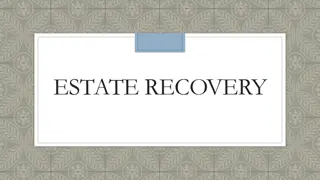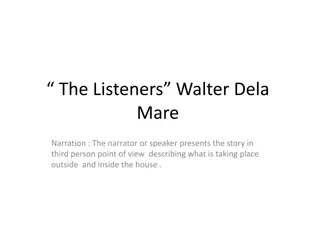Insights on the Hotel Industry Recovery and Traveler Trends
The hotel industry has shown remarkable recovery post-pandemic, with key metrics like RevPAR improving, though full recovery is expected in the coming years. Labor challenges persist, impacting hotel operations. US travelers' plans for 2022 indicate a mix of comfort levels and preferences. Summer 2022 shows cautious optimism among travelers. Short-term rentals are gaining interest as a preferred accommodation choice.
Uploaded on Nov 13, 2024 | 0 Views
Download Presentation

Please find below an Image/Link to download the presentation.
The content on the website is provided AS IS for your information and personal use only. It may not be sold, licensed, or shared on other websites without obtaining consent from the author. Download presentation by click this link. If you encounter any issues during the download, it is possible that the publisher has removed the file from their server.
E N D
Presentation Transcript
Back from the Brink Although far from complete, The hotel industry s recovery has been remarkable. According to STR, a hospitality industry data and analytics company, the all-important RevPAR (revenue per available room) metric regained 83.2% of its pre-pandemic level. In the other two important metrics, the occupancy at the end of 2021 was 57.6%, a 12.6% decrease from 2019, and the ADR (average daily rate) of $124.67 decreased by 4.8%. The ADR was the fourth largest, but the occupancy rate was the second- lowest since 2011. STR s 2022 forecast indicates the ADR will equal 2019 by the end of 2022, but RevPAR won t completely recover until 2023. Factoring inflationary pressures on consumers and hotels, however, RevPAR isn t expected to recover completely until 2025 or later.
The Hotel Business Today Labor has been one of the biggest challenges for all sectors in the larger leisure & hospitality industry, and especially labor availability and costs for hotels, according to 90% of hotel owners the Hospitality Asset Manager Association surveyed during April 2022. The US Bureau of Labor Statistics reported 112,000 jobs were gained in the leisure & hospitality sector during March 2022, but just 25,000 were in the accommodation subsector. Employment in leisure & hospitality was 1.5 million less than February 2020. Since 2006, April 2020 was the month with the most US hotel room under construction at 220,200 and has been generally decreasing since then, with 154,881 during March 2022, a 15.7% decrease from March 2021.
US Travelers Plans for 2022 A February 2022 Morning Consult survey found 60% of all US adults were somewhat or very comfortable taking a vacation. Those with incomes of less than $50,000 were the least likely at approximately 50%. Those with incomes of $100,000 or more were the most likely at approximately 73% and those who had traveled for leisure during the past year at approximately 70%. Approximately 61% said they planned to stay at a hotel during 2022, matching the largest percentages during April, May, June and July 2021 and January 2022. Approximately 68% planned to travel within the US, but less than 20% planned to travel outside the US.
Summer 2022 Travelers Are Still Cautious The leisure & hospitality industry and the hotel subsector, in particular, are optimistic about a significant boost during summer 2022. A March 2022 survey from The Vacationer found 80.84% of respondents said they would travel at least once during the summer. Of those surveyed, 42.1% said they would travel more during summer 2022 than summer 2019, 46.1% would travel the same as last summer and 11.9% less than last summer. Almost half (49.2%) said they would travel on a plane. Similar to the Morning Consult survey cited in slide #4, 60% said they would travel domestically only and just 6.7% would travel internationally only. Almost one-fifth (19.6%) said they won t travel during summer 2022.
Travelers Accommodations Insights A February 2022 STR survey found a short-term rental/self- catering accommodation was receiving more net interest at 16% as a preferred accommodation choice among the respondents. All other types received a minus net interest, except hotels at 0%. Although 40% of the respondents said the pandemic hadn t changed their accommodation preference, full-service hotels and smaller hotels (<50 rooms) attracted more interest at 34% and 32%, respectively. Smaller hotels were preferred because of social distancing. According to the Morning Consult survey, 49% of respondents who plan to travel during the next three months will stay at a chain hotel and 20% said they will stay at a vacation rental. Millennials were the largest generation at 39% and 46%, respectively.
The Evolution of Business Travel STR also surveyed global business travelers during February 2022 and the evidence strongly suggests business travel has forever changed. Too many companies learned virtual meetings were effective and saved substantial amounts from their travel budgets. The STR survey found 42% of businesspeople who traveled often before the pandemic said they don t expect to ever travel for business again. 48% strongly disagreed or disagreed that business travel would return to pre- pandemic levels. The Morning Consult survey revealed an increased interest in bleisure, or a business/ leisure trip mix: 40% said the trip they would take during the next year would be equal leisure and business, 40% said primarily business and 44% said primarily leisure.
Hotel Guests Insights Following a period of many postponed weddings, hotel bookings are increasing, but more couples are planning for fewer guests, although some hoteliers specializing in weddings have bookings for larger events during fall 2022 and into 2023. Although multiple sources support the permanent reduction in business travel, many businesspeople are returning to meetings, events and trade shows. A U.S. Travel Association survey found developing relationships was the biggest draw at 47%. Business group travel has improved, according to data from Amadeus, a hospitality support company. Many groups are booking hotels in remote locations instead of city centers and business events are apt to be smaller, requiring hotels to adjust their services.
The Hotel Investment Picture Brightens Understandably, interest in the acquisition of hotel properties decreased by approximately one-third during 2020, but regained much of that acquisition activity during 2022 and actually exceeded 2019 property purchases. Investors, although active, are more cautious and more interested in value-level properties; however, acquisitions of upscale and luxury hotels now match pre-pandemic levels. Investors are keenly aware of the effect of inflation, but higher room rents are an attraction. Some investors consider the huge infusion of the US government s infrastructure spending to be a long-term positive for the hotel industry and are motivating investors to position themselves for many years of significant ROI.
Advertising Strategies With expectations for a very good summer 2022, hotels may benefit from a Welcome Back promotion, featuring new extras and amenities and helping guests defray the impact of inflation with gift cards to local restaurants, entertainment venues and other services. Hotels targeting business travelers can promote a bleisure package that includes a hotel stay as well as recommended and discounted tickets to local attractions and outdoor activities and possibly offering bicycles, scooters and hiking or camping gear for rent. According to the table on page 5 of the Profiler, travelers are more attracted to trips to small towns and country settings, providing smaller, historical and unique hotels in these locations to promote themselves with a media mix of direct mail and social media.
New Media Strategies Many hotels have undoubtedly used social media to update their pandemic cleaning and health and safety procedures, but asking guests to post comments, especially videos, about how safe they felt staying at the hotel may be more powerful. With more interest in short-term rentals/self-catering accommodations, specialty hotels that offer this option can aggressively use social media posts to promote these types of accommodations and their unique amenities. Business travelers now expect hotel amenities to support their wellbeing during their trips. Hotels can use the table on page 4 of the Profiler to create short videos highlighting each of the amenities and posting them on social media as well as the hotel s video system.







